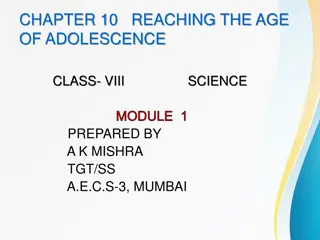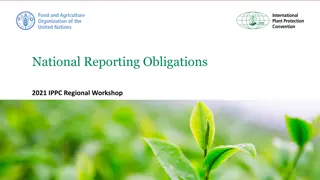Understanding Puberty and Religious Obligations After Maturity
Upon reaching maturity (Buloogh), individuals must fulfill compulsory acts of worship and adhere to laws of modesty, including covering the Satr. Signs of puberty vary for boys and girls, with cleanliness being emphasized in Islamic teachings through practices like Istinjaa. Failure to maintain purity can invalidate acts of worship. Learn about the importance of purification and following the Sunnah of Prophet Muhammad in personal hygiene practices.
Uploaded on Apr 07, 2024 | 4 Views
Download Presentation

Please find below an Image/Link to download the presentation.
The content on the website is provided AS IS for your information and personal use only. It may not be sold, licensed, or shared on other websites without obtaining consent from the author. Download presentation by click this link. If you encounter any issues during the download, it is possible that the publisher has removed the file from their server.
E N D
Presentation Transcript
After becoming Baligh, a person must fulfill all acts of worship, which have been made Fardh (Compulsory) by Allah. Laws of Modesty also become an obligation (covering the Satr). A man s Satr is from below the navel to below the knees. Buloogh (Maturity) Ibn Jarhad informed me from his father, that the Prophet passed by him while his thigh was exposed, so the Prophet said: Cover your thigh, for indeed it is Awrah (Tirmidhi) .
The signs of puberty for a boy are: Wet dream (Nocturnal Emission) Ejaculation If the boy makes a girl pregnant The signs of puberty for a girl are: Signs of becoming Baligh Periods Wet dream She falls pregnant If any of the signs are not found , then a boy or girl at the age of 15 (Islamic years ) will be automatically considered as having reached the age of puberty. Another point worth noting is that pubic hair or hair on the armpits is not a sign of puberty for boys. According to the Gregorian Calendar this equates to 14 years and 6 months.
Cleanliness is half of Imaan (Muslim). Importance of Purification Many books of Ahaadith commence with the chapter of purification. Most (if not all) of the Books of Fiqh commence with the chapter of purification. The key to Salah is Purity (Abu Dawud, Tirmidhi).
Istinjaa is the term used to describe the process in which one removes uncleanliness after they have been to the toilet. If Istinjaa is not done properly then it will leave a person in an impure state. If the person is in an impure state, then all actions of worship which require a condition of ritual purity will not be valid. Istinjaa The Messenger of Allah (Allah bless him and give him peace) said, Ten matters are from upright natural disposition (fitra), and he mentioned among them, Washing away filth (Istinja). [Muslim and Tirmidhi]
Istinjaa is also a Sunnah of our Prophet Muhammad . Hadhrat Anas (R.A) narrates the following Hadith: . . Whenever the Prophet went to answer the call of nature, I used to come and another boy with me, with a tumbler full of water so that he may wash his private parts.
" The Prophet once passed by two graves, and those two persons (in the graves) were being punished. He said, They are not being punished for a great thing. As for one of them, he did not save himself from being soiled with his urine, whilst the other use to walk around causing enmity between friends. He then took a green twig, split it into two pieces and fixed one on each grave. The people said, O Allah's Messenger Why have you done so? He replied, I hope that their punishment may be lessened until both of these twigs become dry.
Correct method of urination Whoever tells you that the Messenger of Allah urinated standing up, do not believe him, for he would not urinate except while squatting. Once, the Prophet saw Umar (may Allah be pleased with him) urinating standing up so he said, Oh Umar, do not urinate standing up. Umar says that after this he never urinated whilst standing . (Sunan al- Nasa i, Sunan Ibn M jah)
What is the problem with urinating in a standing position? It s not a Sunnah of the Prophet Muhammad . When we urinate standing, there will be splashes from the urine, which will touch our clothes and our bodies. Some will be so minute that we will not be able to see them but they will have made us impure. A person cannot totally relieve himself when standing up. If a person sits down and relieves Himself, then there is pressure on the bladder, which will allow the maximum amount of urine to pass.
Hygienically, there is greater chance of infections, diseases and smell if a person stands and urinates. This is due to the reason that they cannot clean themselves properly. The person s underwear as well as his body will become impure (Napaak). What is the problem with urinating in a standing position? The person will not be able to do istibra properly. This is the process in which a person becomes sure that there are no more drops of urine left and he has relieved himself properly. The main reason will be that a person will not be able to attain cleanliness properly, thus raising the probability of invalidating any worship carried out in this state.
Correct method of going to the toilet Before we go to the toilet, we have to make sure we don t leave it till the last minute and go when we are completely desperate. If we wait, then there is a chance that a few drops of urine can come out and make us impure. It is also not good for our health as we put extra strain on our bladder. So let us make sure that we relieve ourselves properly and in good time.
Using a toilet The most common style of toilet is the seated toilet or commode. We must ensure that the seat is clean before sitting on it, so use some tissue paper to clean it first. If needed, you can lay some tissue on the seat as well before sitting to avoid direct contact with your skin. We must ensure that after we have finished all the tissue paper is disposed of correctly and if the seat is wet, we wipe that clean as well.
Before we go to the toilet, we should recite the supplication mentioned in the Hadith below and we should enter with our left foot. General etiquettes when going to the toilet Hadhrat Anas (R.A) said Whenever the Prophet Muhammad went to answer the call of nature, he used to say, All h-humma inni a udhu bika minal khubuthi wal khaba ith (Bukhari) . O All h, I seek Refuge with you from all offensive and wicked things (evil deeds and evil spirits).
Once we have entered the toilet, we should try not talk to anyone while we are relieving ourselves. General etiquettes when going to the toilet We should not read anything inside or use any devices including mobile phones and hand held gaming devices. Try and spend the least time inside as possible. When removing your clothes, or lowering your garments, make sure that they do not touch the floor or there is a risk that some uncleanliness can transfer onto your clothes. Some toilets can be very dirty and very often there is urine on the floor as well, so take extra care.
Remove your socks before wearing any slippers which are used especially for going to the toilet, especially in a Masjid or Madrasah. A very common problem nowadays is people wear their socks while they are in the toilet. The slippers may have some uncleanliness on them and when the person leaves their socks on inside the Masjid or Madrasah, the uncleanliness can spread. General etiquettes when going to the toilet Make sure you have no rings or amulets with All h s name on it, or the Quran, or any other prayer material when we go inside the toilet.
It is Makrooh Tahreemi (very undesirable) to face the qiblah or have our back towards it while relieving ourselves. The hadith below explains this. General etiquettes when going to the toilet Abu Ayub Al-Ansari (R.A) narrates that All h s Apostle said: If anyone of you goes to an open space for answering the call of nature, he should neither face nor turn his back towards the Qiblah, he should either face the east or the west. The reason why east and west was mentioned in the above Hadith because Madina was to the north of Makkah, so by facing either east or west, you would either avoid facing or turning your back towards the Qiblah. This is true even in buildings, because the prohibition is not conditioned. If the toilet is built in such a manner that it is facing the actual Qibla, one should simply adjust the way he sits and try to ensure he doesn t face the actual Qibla.
General etiquettes when going to the toilet When the Prophet would exit the toilet he would say: Ghufranak. (your forgiveness) (Tirmidhi). So what should you recite when you leave the toilet? Whenever the Prophet exited the toilet, he would say: Al- hamdu lillahilladhi adhhaba annial-adha wa 'afani (Praise is to Allah Who has relieved me from discomfort and granted me relief) (Ibn Majah) So both of the above supplications (Duas) can be read together as follows:
What can we do Istinjaa with? Before we answer to the call of nature, it is important that we have with us the necessary items we need to become clean. The last thing we want is to go to the toilet and find there is no tissue paper, water or utensil to clean ourselves with. Originally, before tissue paper was invented people would use clots of soil or stones. The stones were the type which had natural absorbing qualities so the uncleanliness would be easier to remove. We also have to remember that the diet of the past people was very different to ours. Their excretion would be mostly hard, dry and not spread, so it was easier to clean. The substitute to stones nowadays would be tissue paper. So if the uncleanliness has not spread and a person cleaned themselves with tissue paper until they were sure that all of the uncleanliness has been removed, it will be enough.
What can we do Istinjaa with? Washing it with water is better! Like it was mentioned earlier, the characteristic of the excretion of the past people was very different to what it is nowadays. Our diets and food have changed, so when we relieve ourselves it is difficult to attain cleanliness with only tissue paper. Therefore to be sure, it is better to use water as well to clean ourselves.
What to do if uncleanliness spreads? By using just tissue paper, we would first have to use a lot of tissue. The tissue paper will also not be able to completely remove it. The cleaning qualities of water and tissue cannot be compared. The water will remove the impurity, the smell and the effect of the impurity; whereas with tissue paper there is a possibility some of these will remain. If the uncleanliness exceeds its origin and spreads, then we have to use water to remove it.
One should not perform Istinjaa with a bone, or with dung, or with food, or with the right hand. What one should refrain from? The main point for us from the above is to not perform Istinjaa with any item that can cause us harm, or an item that does not have absorbing qualities. We must also make sure we don t use the right hand to clean ourselves.
There is a difference in the method between men and women when it comes to attaining cleanliness after urination. Males have to perform Istibra which is the process of ensuring that no urine is left in the private part after urination. Women do not have to perform this. However, they must be confident that they have relieved themselves fully. Method of Cleaning after Urination Once this has been done, it is recommended to use some tissue paper first (with the left hand) to absorb any drops of urine which may be left and then wash the private area with water. When washing, the utensil must be held in the right hand and the left hand should be used to clean the actual area.
Istibra If a person has urinated then they must do Istibra. Istibra is the process with which a person makes sure that all of the traces of urine have come out completely. So how can we do istibra? To shake, sway or squeeze the private part very gently Coughing Taking few steps Passing water over the private part and waiting There are no restrictions in how to do istibra as long as one is sure that all traces of urine have come out. It is very common that after one gets up they feel that there are still traces of urine coming out. A common remedy for this is to use tissue paper inside the underwear. If any traces do come out then the tissue can be removed and the private part can be washed again.
General Questions related to Istinjaa Question: At school or work we have no utensil for water, how do we perform istinjaa? Answer: You should keep a small empty bottle with you at all times so when the time comes for you to go to the toilet you can take it inside the cubicle with you. If there is no sink inside the cubicle, make sure you fill the bottle before you go in. Make sure you know how to perform Istinjaa with that amount of water. Use tissue paper first to remove the uncleanliness then use water after. If it is too difficult to take a bottle into the cubicle and you want to be more discrete, then other products are available in the market from vendors such as wudu mate who produce plastic containers which can fold up and be easily put inside the pocket.
Question: Can I use wet tissue paper to clean myself? Answer: General Questions related to Istinjaa If one has only urinated, then use dry tissue paper first to absorb the remaining drops of urine. Then the wet tissue paper could be squeezed so the water is passed over the private area. If the person has also passed stool then it is recommended that dry tissue is used first, then the wet tissue paper. One must be sure that the uncleanliness has been removed. As much as one can help it, they should try an use water, so no doubts enter their mind that they are not clean.
Summary of Istinjaa Istinjaa is a necessary and integral part of keeping clean. We must learn how to do it and do it properly. Both religiously and hygienically, it is beneficial. It safeguards a person from catching infections, diseases, protects them from bad smells and most importantly keeps a person in a pure state from an Islamic Point of View. All of the worship a person does will be Valid. On the other hand, a person who stays impure does not fulfil the conditions of prayer. If any of the conditions of a prayer are not complete, then the prayer will not be deemed invalid. All the effort and time will be futile.
Ghusl Ghusl is the procedure, which a person undertakes to clean their body from ritual impurity or Janaabat . If a person does not do Ghusl properly, then he will not leave the state of Janaabat and any acts of Worship, which require a condition of cleanliness, will not be valid. When does a person need to have Ghusl? For males, Ghusl becomes compulsory after any form of ejaculation, which could be in the following scenarios: After a wet dream. After having intimate relations with your wife.
There could sometimes be a need to only perform the Fardh (compulsory) acts of Ghusl in certain situations. For example, if there is a shortage of water, or of time etc. For a person to become ritually pure, they must perform at a minimum the following 3 actions: Compulsory acts in Ghusl 1. To gargle the mouth once. (If fasting ensure water does not get swallowed, keep water in mouth). 2. To clean inside the nose once (If fasting, ensure water does not pass through the nose into the head). 3. To wash the whole body once, ensuring no space is left dry (even that which is equivalent to a hair). Once the above actions have been completed, a person will now be considered clean and ritually pure.
Ghusl Ensure the whole body has been washed! There are certain places in the body where people sometimes forget to wash or it may be difficult for water to reach these areas. Water must reach any opening in the body which is not sealed like an ear piercing. We must also ensure to wash the inner part of the navel and ensure that water reaches all the external parts of our private area. Water must also reach the skin under the eyebrows. If a male has long hair or a thick beard then they must take extra precaution when washing to ensure water has reached the scalp and face areas which are covered by the hair.
Sunnah Method of Ghusl If a person has enough time and there is no shortage of water then it is recommended that they perform the Sunnah method of Ghusl, which is as follows: 1. 2. 3. Make Niyyah. Wash your hands up to your wrists. Then wash your private parts ensuring that all uncleanliness is removed. The hands and private parts should be washed first irrespective of whether there is any impurity on them or not. Also wash any other areas on your body, which have impurity on it. Remember if any impurity has moved onto your hands this also now needs to be washed off. Then perform complete Wudhu. Finally wash the whole body 3 times (ensuring no part is left dry even equivalent to a single hair). Wash the head first, then wash the right side of the body and then wash the left side. 4. 5.
What to do if water collects in the place of Ghusl? If water collects in the place of Ghusl then one should leave washing the feet to the end. So if you are having a shower and the water is not draining quickly enough ,then you should complete the whole Ghusl except washing the feet. Just before you finish, you should wash both of your feet 3 times. It is recommended that the shower be turned off for a little while, so the water completely drains, and then wash your feet.
Masaail relating to Ghusl Gold, silver teeth or Gold caps fitted in teeth Ghusl will be done. Whilst bathing, it is preferable not to face the qiblah. If the bathing place is secluded where no can see, it is permissible to bath naked, irrespective of whether one is standing or sitting. However, it is better to sit and bath because there is more modesty in this. Fatawa Hindiyah Ad-Durr al-Mukht r
Masaail relating to Ghusl Question: What is the ruling with regard to performing Ghusl after giving ghusl to a deceased? Answer: It is Mand b and Mustahab to perform Ghusl after having given Ghusl to a deceased person. : : : : : Based on the first Had th, we learn that it is obligatory. However, from the seocnd Hadith and the saying of Hadrat Ibn Umar, the obligation falls off and the ruling of desirability remains as stated by the jurists.
Masaail relating to Ghusl Question: A person had conjugal relations with his wife or had a wet-dream. After performing Ghusl, the remaining semen emanated. Does he have to repeat his Ghusl? If the same is experienced by a woman, what is the ruling? Answer: A person had conjugal relations with his wife, performed Ghusl and semen emanated thereafter. If this happened after he walked quite a bit, after urinating or after sleeping, he does not have to repeat his Ghusl. However, if it emanated before walking quite a bit, before urinating or before sleeping, then it is necessary for him to repeat his Ghusl according to Im m Ab Han fah and Im m Muhammad rahimahumall h. Im m Ab Y suf rahimahull h is of the view that ghusl does not have to be repeated. There is leeway to act on the view of Im m Ab Y suf rahimahull h at the time of necessity. However, in normal conditions it is necessary to repeat the Ghusl because there is more caution in this; and caution in matters related to impurity is preferred. If a woman faces this problem and the liquid is hers, the same rule applies. If the liquid which emanates from her body is the man s semen, she does not have to repeat Ghusl. Wud will suffice.
It is permissible but somewhat disliked to cut one s nails and to remove hair from the private parts in the state of impurity. If a person missed washing a body part during Ghusl, then they will merely have to wash that part of the body when they come to remember. For example , if a person forgets to wash their ears during Ghusl and remembers once bathing is complete , then he will only have to wash the ears thereafter , even if he dried his entire body. Masaail relating to Ghusl
Masaail relating to Ghusl Question: Is the Ghusl for Jumu ah Sunnat for the Jumu ah Salaah or is it regarded as being a Sunnat for the day of Jumu ah? Answer: There are two opinions. 1)Imam Abu Yusuf Ghusl is Sunnat for the Jumu ah Salaah. 2)Imam Hasan ibn Ziyad - Ghusl is Sunnat for the day of Jumu ah. Ruling: Fatwa is given on opinion of Imam Hasan ibn Ziyad for matters of easiness.
Three types of Fluids Upon maturing, the body releases different types of fluids from the private area. The fluids are as follows: Mani (Semen) is a thick, white fluid. This is released on certain times such as relations with one s spouse or after having a wet dream. Ruling It is Fardh (compulsory) to have a Ghusl thereafter. 1) 2) Madhi (Pre seminal fluid) is a thin, clear liquid which is released during or after arousal. Ruling The releasing of such a fluid will invalidate Wudu. 3) Wadi is a thick, murky, white liquid that resembles Mani (semen) in thicknes but not in murkiness. It comes out before or after urination. Ruling The releasing of such fluid will also invalidate Wudu.
Wudu Literal meaning: To purify oneself . Sharan Meaning: To wash and to wipe over specific parts of the body. There are four compulsory acts in Wudu: 1) To wash the entire face once. It is obligatory to wash the outer part of a thick beard, within the limits of the face. It is Sunnah to wash the part of a beard that falls beyond the limits of the face and also Sunnah to pass a wetted hand through the beard. It is not called upon to get water to all the hair of a thick beard, nor through to the skin under it, because of the difficulty entailed. Ruling for Eyebrows and Moustache is same as beard. Area between eyes and nose must also be washed.
Compulsory acts in Wudu 2)To wash boths hand upto and including the elbows once. The elbow must be washed too. Someone has an extra finger, this must also be washed. If Rings etc are so loose that water will reach under them without having to remove them, it is still Mustahab to remove them. If they are so tight that there is a possibility of water not reaching under them, then it will be necessary and Wajib to remove them.
Compulsory acts in Wudu 3) To make Masah of one qaurter of the head once. Masah means to pass over a wet hand. At least 3 fingers must be used to do the Masah. If less than three fingers , Masah will not be done. 4)To wash both the feet up to and including the ankles once.
Sunnah method of Wudu Lets do it practically !
Anything that exits from the two openings Filth that flows from other than the two openings Factors that break Wudu Vomiting a mouthful or more. Sleeping in a position such that the backside is not firmly planted onto the ground, such as whilst lying down or leaning on one side. Loss of consciousness Insanity Laughing out loud, while performing Salaah.
Question: What is the ruling with regard to a person who wants to take help from another for performing wud ? For example, he asks him to pour the water or to wash his hands and feet for him. Answer: A person may help another to perform wud as long as it is to the extent of pouring water for him, but if he asks the person to wash his hands and feet for him without a valid reason, then it is makr h. There are three types of extending help: Masaail relating to Wudu (1) Asking the person to bring water for you. This is permissible. (2) Asking the person to pour the water for you. It is not the best thing to do unless the person has a valid reason. (3) Asking the person to pour the water and to wash the limbs. This is makr h if there is no valid reason.
Masaail relating to Wudu Question: Is it permissible to perform wud while wearing contact lenses? Answer: It is permissible to perform wud while wearing contact lenses because it is not essential to wash the inner part of the eyes when performing wud or ghusl. However, it is not permissible to shut the eyes so tight when performing wud that the corners of the eyes remain dry. It is necessary to wash the corners. Al-Fat w al-Hind yyah:
If a wound can be washed without any harm by removing the bandage or plaster, then a person must wash the wound and perform Wudu or Ghusl as normal. If the wound cannot be washed but Masah can be done on the wound without any harm, then one should do Masah on the wound. However , if a wound cannot be washed and Masah can also not be done due to the problem increasing or it is not possible to remove the cast, bandage or plaster, then one should do masah over the cast, banadage or plaster and complete Wudu normally. Masah on wounds Masah over a plaster/cast will remain valid until the wound etc. completely heals. If the plaster/cast is changed, it will not be necessary to repeat the Masah over the plaster/cast and the Wudhu will remain valid. Upon the wound completely healing, Masah over the plaster/cast will now not suffice and it will be necessary to wash the healed area. (Jadeed Fiqhi Masaail 1/62) Note: Masah over a plaster/cast will only be valid in the case of a valid Shari reason e.g. if the wound will not heal completely if the plaster/cast is removed.
Question: If a bathroom has a high pan toilet with a lid, can the various du s for wud and so on be read there? Answer: A bathroom is generally not clean. Therefore, like the toilet, when entering a bathroom, a person must enter with the left foot and exit with the right foot. It is masn n to read Bismill h before a ghusl, but it must be read before entering the bathroom. When he completes and exits the bathroom, he must read the du which is read after performing wud . Masaail relating to Wudu If the toilet pan in the bathroom is covered and due importance is given to the cleanliness of the place, a person may read Bismill h and other du s while performing Wud .























